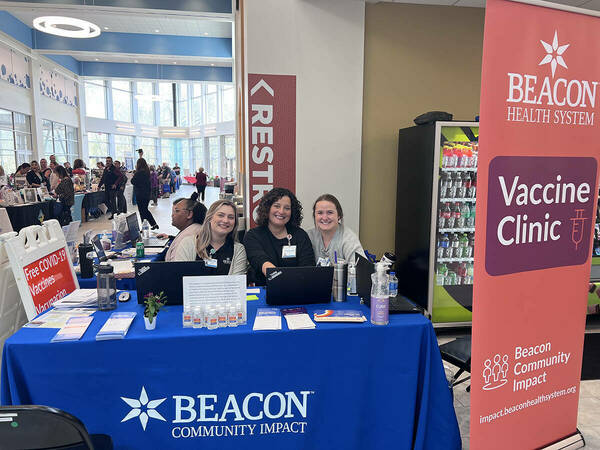
Who has their finger on the pulse of public health? One could argue it’s community health workers (CHWs).
Some CHWs work in clinics and others are mobile, moving through city neighborhoods and rural areas, sometimes going door to door or hosting resource tables at community events. The workers serve as a link between health and social services and people facing barriers that threaten good health.
“These individuals are working on the front line of health, listening and building trust within our community to improve our system of care. Their work is critical in understanding the needs that exist and in helping develop solutions,” Jessica Brookshire, senior program director in the Office of Clinical Partnerships at Notre Dame, said.
To join the Michiana Community Health Coalition, contact: Jessica Brookshire at jbrooksh@nd.edu or (574) 631-5829
What CHWs and others in similar roles learn on the ground is not just of interest to the public health sector, but also to those who study social determinants of health.
That’s why the University of Notre Dame convened the Michiana Community Health Coalition, a coalition of community health workers, community navigators and certified addiction peer recovery coaches with the goals to improve public health in the South Bend-Elkhart community, advance University research, and provide education opportunities for Notre Dame students.
Monthly meetings
The MCHC meets once per month to share knowledge and resources and pursue solutions to issues that commonly contribute to disparate health outcomes in the U.S., from lack of access to quality, affordable housing and transportation to poverty, educational inequality and mental health.
The group discusses issues and learns from each other as well as guests, including community experts and Notre Dame researchers. These conversations are also invaluable for researchers to truly understand on-the-ground issues and collaborate with community partners.
Coalition members serve as liaisons between the community and local health systems, helping to facilitate access to care and improve the quality and cultural competency of individual organizations and providers.
A growing coalition
Brookshire, along with Jennifer Lefever, managing director of the William J. Shaw Center for Children and Families, and Jill Pentimonti, director of research advancement and Federal Relations, organized the group. Initially, it started with four organizations — Beacon Health System, Saint Joseph Health System, St. Joseph County Department of Health and Oaklawn. The coalition now counts more than 20 organizations from across St. Joseph, Elkhart and Marshall counties in northern Indiana.
According to Brookshire, this growth speaks to the needs that exist. From the perspective of health organizations, it also speaks to the importance of outreach, cultural competency and health literacy, as well as the need to engage with and learn from individuals who are trusted members of the community.
Already, the coalition has developed a network to improve access to care and resources across all segments of the community. This includes things such as housing, mental health care, food programs, advance care planning and chronic disease management.
A Beacon for expectant mothers
Charrise Gray is a community navigator at 1Roof Southeast, a neighborhood center built by the United Way and opened about a year ago. It’s her job to connect clients who come into the center looking for help with housing, food and other needs with community resources. She’s been working on a database of resources since even before 1Roof opened.
“So if a client comes in and it’s housing she needs, our database shows all the resources in the community that help with housing. That way, we’re able to serve that person quickly and not take up a lot of her day.”
Gray attended her first MCHC meeting in July.
“Coming to this meeting, I discovered there are a lot more resources that I have not tapped into yet that I am going to add to our database as soon as I get back,” she said.
Gray’s favorite piece of new information was learning about Beacon Health System’s Family and Infant Support Program.
Kimberly Green Reeves, executive director of community impact for Beacon, explained the program this way: “We walk alongside at-risk expectant mothers as well as postpartum up to a year after the baby is born to ensure they have access to all the available resources and support they may need.”
The program offers women assistance to women whether they are patients of Beacon or not.
“If the woman happens to be a patient of one of Beacon’s OB/GYN offices, we can work with the medical team to ensure the patient is able to get to her appointments. We’re also happy to do home visits and make sure they have everything they may need for a successful birth.
“If they are not a patient of Beacon’s we still provide great services, ensuring they have access to food and housing, child care and transportation and we offer parenting and car seat education. We also offer peer to peer support through our Beyond the Bump program where expectant and new moms can share their best practices with each other.”
Funding
The coalition is funded by the Lucy Family Institute for Data and Society, which recognized the potential of the group to establish collaborations within and between community partners. In fact, after conversations during MCHC meetings, the Lucy Family Institute, the Notre Dame Lead Innovation Team and various community partners proposed and were awarded a grant from the National Science Foundation to develop new tests and technologies to reduce childhood lead exposure in the South Bend-Elkhart region. Beyond the grant, the Center for Civic Innovation and John J. Reilly Center for Science, Technology and Values has collaborated with the MCHC on student projects to support the coalition and benchmark work across the United States.
Ultimately, the group plans to work with a variety of campus and community partners to engage in conversations to improve the health and well-being of the community, including securing funding sources that connect needs with resources.
Originally published by at publicaffairs.nd.edu on July 31, 2023.